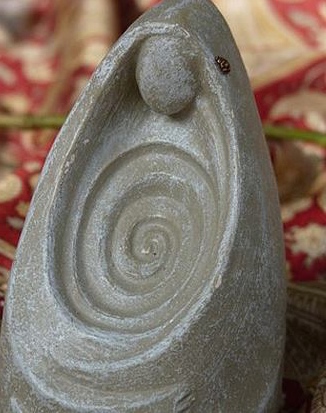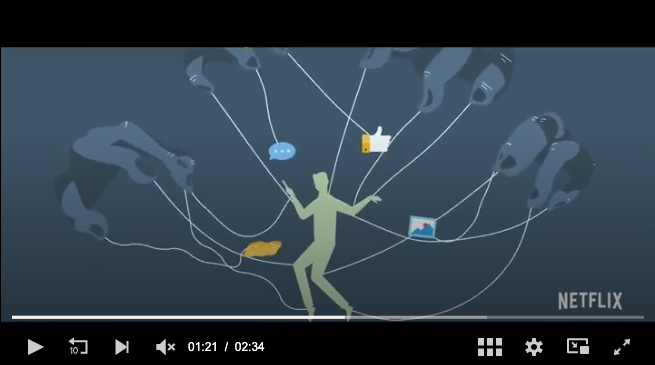I don’t know about you, but my relationship with my phone has become annoying. The compulsion to check it incase there’s something exciting is now so irritating. Clearly phone addiction is not a new issue, so forgive me for being 10+ years behind. In this article I ask some questions of you, explore the messages of the recent documentary about social media, The Social Dilemma, and consider the bigger picture of the quality of our minds and what we might do about it.
I am slow to adopt new tech and thought I was doing well with regards to my relationship with my device. Now I feel clearly that the quality of my attention and ability to be present in an activity has reduced.
So how is the quality of your mind?
- Are you able to focus on one thing long enough that it satisfies you and you are “in” the experience?
- How quickly do you notice you are going down a rabbit hole of a “story” you might be making up?
- How many times a day do you think you pick up your phone just out of habit?
- Is there a constant anxious energy in the background pulling at you?
- Do you ever sit with the underlying anxiety or “pull”?
- What is it wanting? What is underneath?
- What do you do to help your mind be healthy and strong?
Our shorter attention span
Dr Gloria Mark (American Psychological Association) confirms that according to research, we now have shorter attention spans. While there are a range of factors contributing to this shift in our attention, the impact of social media is significant.
The Social Dilemma (currently on Nettflix) shows how social media is intentionally designed to change our minds and our behaviour.
“It’s not enough that you use the product consciously, I want to dig deep down into the brain stem and plant inside of you an unconscious habit, so you are being programmed at a deeper level. You don’t even realise it…
Every time you see it there on the counter and you know if you look over it might just have something for you, so you play that slot machine to see what you got. That’s not by accident, that’s a design technique.” Tristan Harris
Harris is former design ethicist at Google, and co-founder of the Center for Humane Technology.

Harris talks about the positive intermittent reinforcement that is intentionally used by designers to create an unconscious habit in us to pull us back into using social media. They are intentionally creating a dependency in users.
The documentary also speaks to the resulting demise of our ability to regulate or soothe ourselves;
“We’re training and conditioning a whole new generation of people that when we are uncomfortable or lonely or uncertain or afraid we have a digital pacifier for ourselves that is kind of atrophying our own ability to deal with that.” Tristan Harris
All this behaviour change is the actual product that the corporations are after:
“It’s the gradual, slight, imperceptible change in your own behaviour and perception that is the product.” Jaron Lainer, a computer scientist and virtual reality pioneer
Harris also points out startlingly how indirectly social media, without adequate regulation, can contribute to a deeply polarised society, as we are only shown content that fits with what we already believe.
Reboot your use!
Do you feel that your phone use needs attention? The Social Dilemma has good resources on its website for taking action, including tips for making your phone less compelling and wider advocacy and action you can take.
Do you wonder how addicted you actually are? Take this test
The author of How to Break Up With Your Phone suggests these practices.
Reboot your mind!
Beyond attending to my phone use I feel I need to reboot my mind more broadly. Is anyone with me?
Back in my 20s I attended a bunch of meditation retreats and had a regular practice. I took vows of refuge in Buddhism and even remember my Buddhist name! Also the businesses aiming to get my attention were not yet in full force or hadn’t got to me yet. My mind felt reasonably astute and clear.
Now it can be really pretty appauling honestly. Good thing I am a therapist because being in that seat is a practice of presence. That and my circus practices like silks and stilt-walking. And reading to my son. Phew. At least there are a few places.
Given the “reboot your mind” theme stewing in my mind, I enjoyed learning about a course recently on Tapestry, “Monk for a month” (CBC radio).
Living Deliberately
Living Deliberately is an apt phrase for the being incharge of one’s own mind experience that I am after. The phrase comes from a university class at the University of Pennsylvania run by Justin McDaniel, Living Deliberately, in which students sign up to a monk’s life for a month.
Students take a vow of silence, no phones, no alcohol, no sex. Since it started in 2002, it’s so popular McDaniel annually has 300 applications for under 20 places. And noone has dropped out after the month has begun. Students from all disciplines are craving a break, wanting to get off the ambition train for a time. They seem to crave also the structure that enables them to stop.
McDaniel comments that we are apt to want to add more things to life like yoga, meditation, exercise etc to improve ourselves. He teaches that we actually need to remove things.
Other mind rebooting ideas
Personally I’ve started to sit again. To simply notice the monkey mind and go back to really basic meditation practices that I was once so familiar with. Like some of the students interviewed after their course with McDaniel noted, amidst the fray of daily life it’s relieving to know that you have a base of experience that you can go back to.

I’ve made a nice space and am gathering my few books on meditations I have appreciated in the past, and am finding my way back to a regular practice.
Incase you are inspired to do a meditation retreat check out these local resources from Mindfulness Hamilton.
Some folks like to try the many mindfulness apps that are out there. The NY Times likes these 3.
Again I’m a bit slow to change and haven’t tried the meditation apps, so I go back to a basic body scan (like one from John Kabat-Zinn) or breath meditation (a range from Tara Brach).
What are you going to do?
Related posts
Mindfulness tools for everyday sanity
How to talk so your inner critic will listen
The buddhist practice of Tonglen




